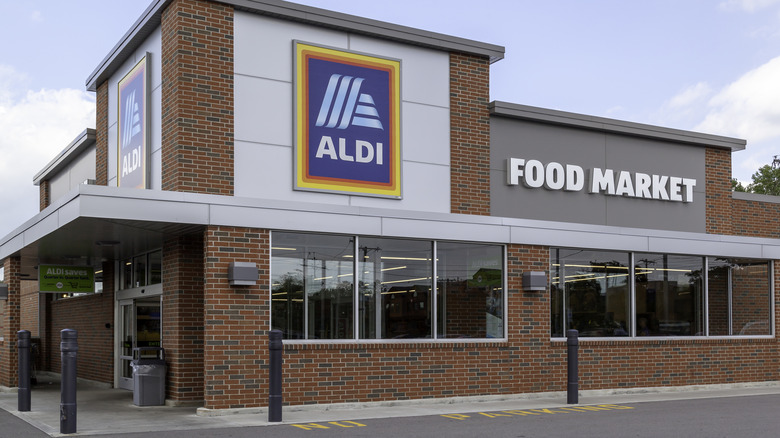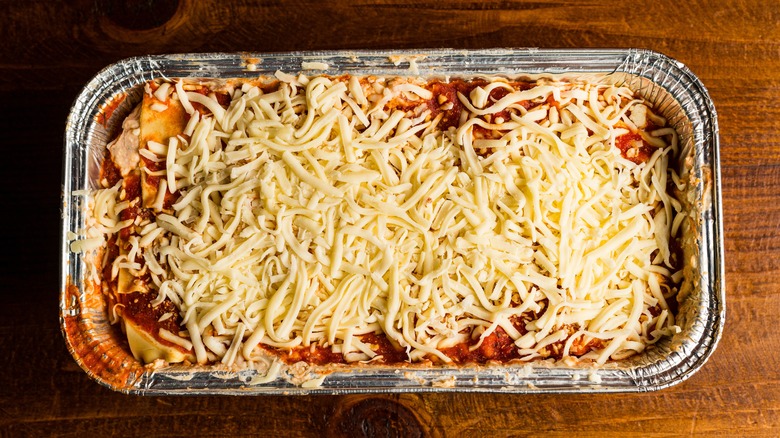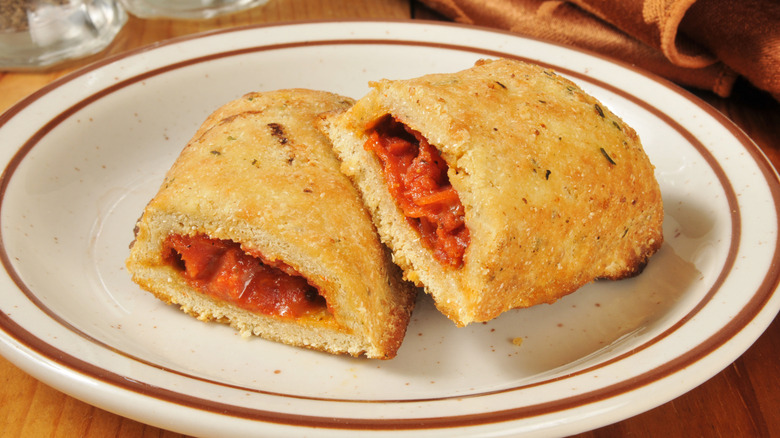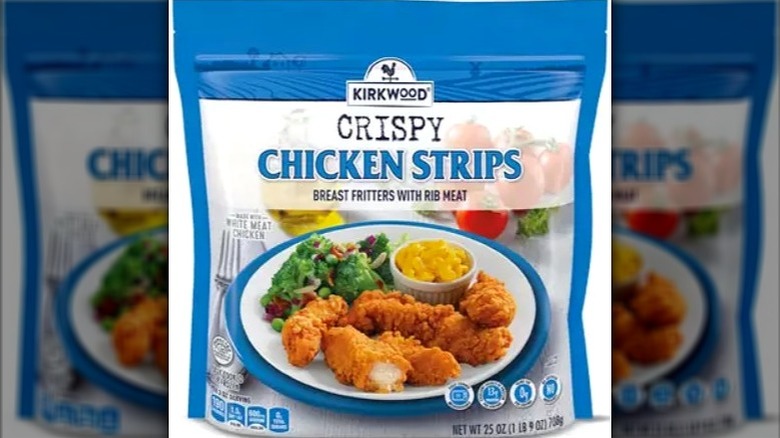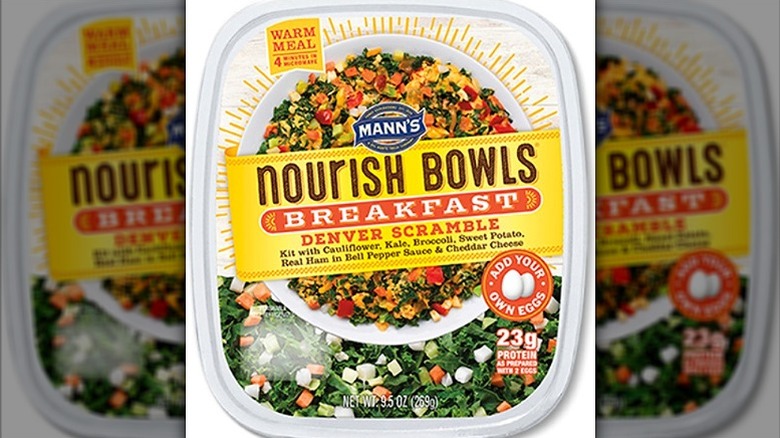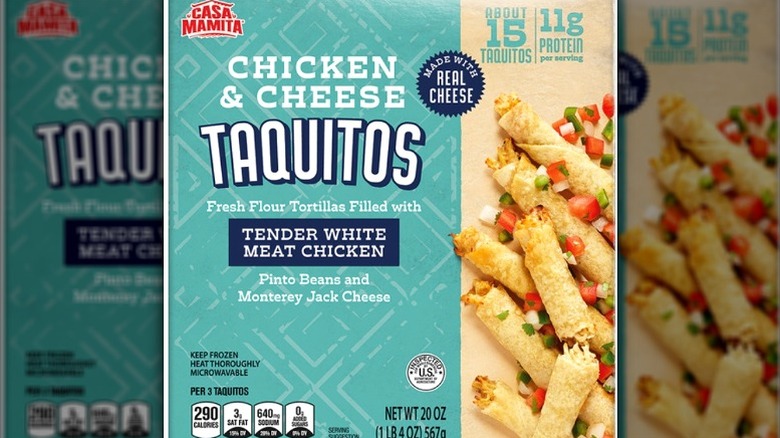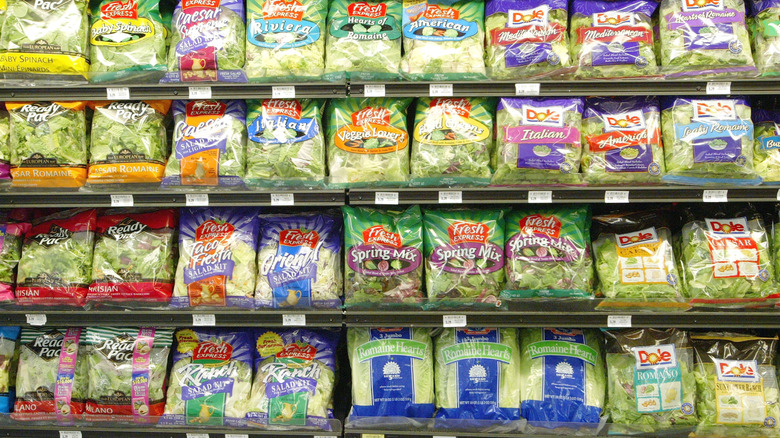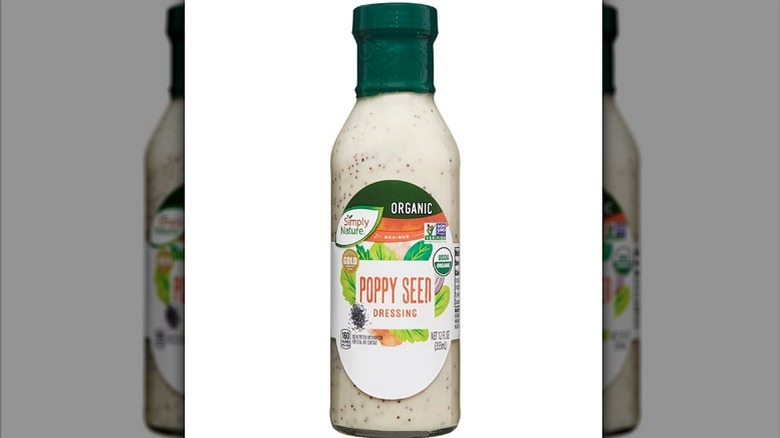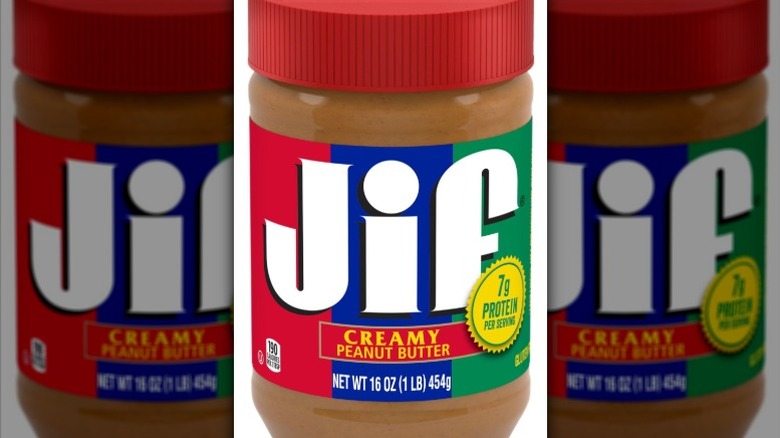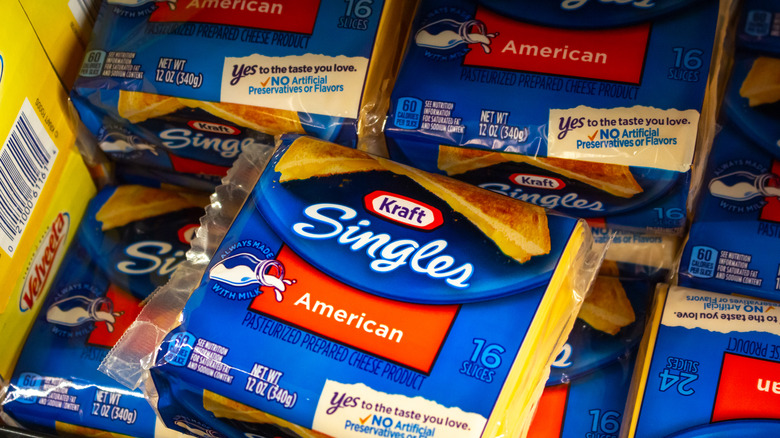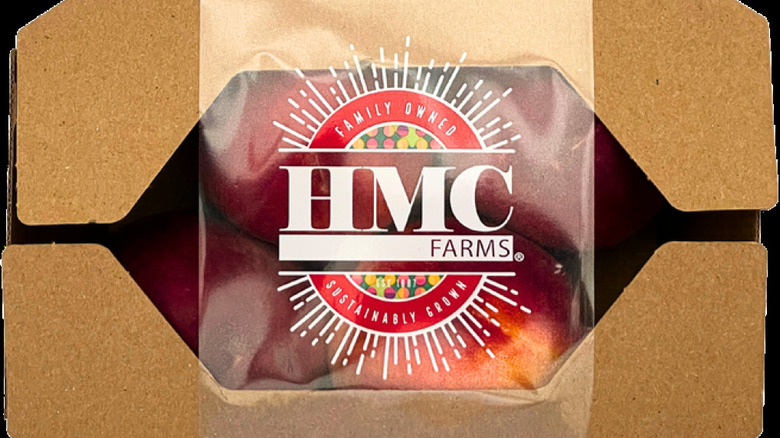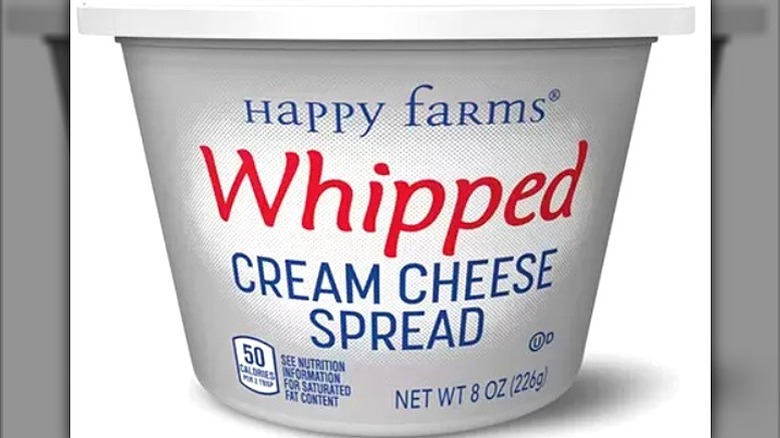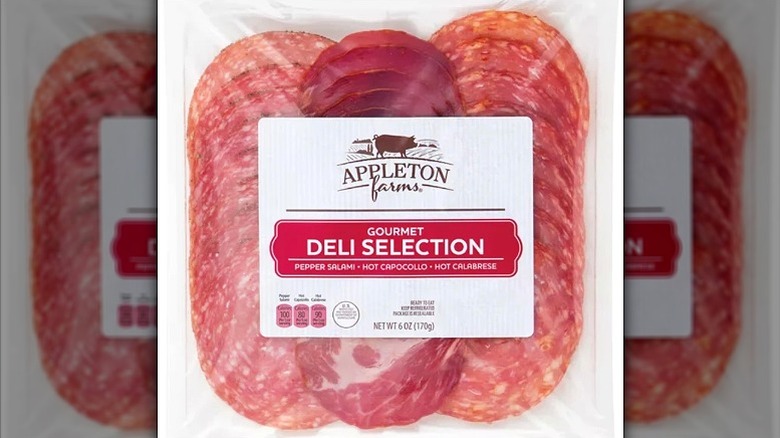The Biggest Aldi Recalls Of All Time
Food recalls are unsettling but not an uncommon occurrence — grocery stores across the U.S. experience them from time to time. From 2002 to 2023 there have been more than 35,000 food and beverage recalls in the U.S., according to the U.S. Food and Drug Administration, via Science Direct. More than 90% of those recalls were for contaminants, the majority of which were biological and allergen-related, while the remaining recalls were because of processing issues. With the number of food recalls that happened in the last two decades, it's not much of a surprise that Aldi has been affected.
Aldi is one of the largest discount supermarket chains in the world, including Aldi Nord (north) and Aldi Süd (south), and has over 2,400 stores in the U.S., with more than 12,000 stores in 18 countries. The company is known for its gourmet choices at budget-friendly prices, offering consumers specialty food and kitchen products that often rival high-end brands. Though it's unclear the total number of food recalls Aldi has experienced over its history, there have been 67 recalls since 2018 – some of which were much bigger deals than others. We've gathered up a list of some of the biggest food recalls in Aldi history.
2013: Prepackaged foods made with horse meat
The Aldi horse meat scandal of 2013 was certainly one of the more embarrassing recalls in the company's history. Unbeknownst to the giant supermarket chain, one of its suppliers made a major blunder when it provided several European supermarkets with prepackaged foods made with horse meat instead of beef. The supplier, Comigel, claimed deniability and pointed to its meat source as the likely cause of confusion. Though this recall was not considered a safety risk, the blatant misleading ingredient list was the concern for pulling the tainted products, namely Today's Special frozen beef lasagna and spaghetti bolognese.
An investigation into the mislabeled meat led to legal action against those in the supply chain, resulting in arrests and convictions for the horse meat debacle. The slaughterhouse where the meat originated was put under investigation for animal abuse. The products were tested and shown to contain anywhere from 30% to 100% horse meat instead of beef. While horse meat in and of itself is not unsafe for consumption, horses have to be tested for phenylbutazone — sometimes referred to as bute — which is a veterinary drug that can cause serious harm to people if consumed. The UK Food Standards Agency was unable to trace all of the horses involved in this meaty mess, but a small percentage of the ones they could test were positive for the drug. There were no reported illnesses due to this scandal.
2018: Undeclared peanut allergen in prepackaged noodle bowls
One of the most popular reasons for a food recall is an undeclared food allergen. In August of 2018, Aldi, with the cooperation of Marketing Concepts Group, LLC, voluntarily recalled its Fusia Asian Inspirations' Spicy Mongolian Heat & Serve Asian Noodle Bowl from all locations for not properly labeling it with the potential presence of peanuts. Though it was a limited-time-only product, it was sold at every Aldi location, making it a significant recall for the company. On a positive note, there were no reported illnesses due to the mislabeling at the time of the recall.
Peanut allergies are one of the most common food allergies in the U.S., typically with children. But peanut allergies are also on the rise, which is a cause for concern because they can be life-threatening for some people. A bad reaction to peanuts can result in anaphylaxis, an acute and potentially lethal reaction that requires immediate medical attention. Though heat-and-serve food products are handy to stock in your kitchen, consider making your own noodle bowl (sans peanuts) and reduce the potential risk of a peanut allergy lurking in your pantry.
2018: Ice cream bars tested positive for listeria
In 2018, Fieldbrook Foods Inc. declared a voluntary recall out of an "abundance of caution" in connection with its ice cream due to the possibility of listeria contamination. A sample testing showed the presence of listeria monocytogenes in a few ice cream bars — bacteria that can lead to a potentially serious infection requiring medical attention. A listeria infection is considered rare, and symptoms can vary from person to person, but there were no reported illnesses due to the ice cream products.
Spanning numerous retailers, such as Aldi, Kroger, Dollar Tree, Giant Eagle, Meijer, and BJ's, the recall affected multiple types of ice cream bars, including Aldi's brand, Sundae Shoppe. Aldi worked with the supplier to remove the potentially affected ice cream from its shelves, issuing full refunds to customers who brought the products back to the store. The recalled products included Sundae Shoppe orange cream bars, raspberry cream bars, and chocolate-covered vanilla ice cream bars.
2019: Consumers claimed plastic found in stuffed sandwiches
When you bite into a stuffed sandwich, it'd be concerning — and possibly dangerous — if you came across something inedible like foreign material. In 2019, J & J Snack Foods Handhelds Corp. recalled almost 60,000 pounds of stuffed sandwich products after consumers complained about pieces of semi-transparent plastic in the food. The recall, which included Bremer's classic pepperoni pizza and ham and cheese stuffed sandwich varieties, were available at select Aldi stores in the U.S. Though the stuffed sandwiches were not sold at every Aldi location, multiple stores in 29 states were affected.
Aldi stores from New England to Texas pulled two varieties of Bremer's stuffed sandwiches from its shelves and urged consumers to toss affected products with a specific UPC code. Alternatively, customers could opt for a refund by returning the product to the store. There was no confirmation of plastic pieces being found in the recalled food and no illnesses were reported.
2019: Metal pieces allegedly found in chicken strips
A massive chicken strip recall occurred in 2019 that prompted Tyson Foods, Inc. to advise pulling almost 12 million pounds of product from retailer shelves. Multiple private brands were affected, including Aldi's Kirkwood. The recall included Kirkwood buffalo and honey BBQ crispy chicken strips that were sold across 29 states. This large recall was the result of two customer complaints about metal fragments found in the chicken strips, but it's not clear which retailer or location the customers shopped at. Foreign material in food can cause potential injury and digestive distress. At the time, no injuries were reported.
While the investigation was ongoing, four more complaints were made regarding metal pieces and three of those complaints alleged oral injury as a result. Tyson responded by removing the suspected faulty equipment that was being used. In addition to this action, Tyson intended to install updated metal detectors for scanning its products. On top of that, the company planned to use a third-party verification system.
2019: Possible listeria detected in breakfast bowls
In 2019, Mann Packing Co. voluntarily recalled a number of vegetable products due to the risk of listeria monocytogenes contamination. A wide range of food products were immediately removed from retailers across the states. Packages of broccoli, Brussels sprouts, and cauliflower, and vegetable dishes like bowls and blends, involving Del Monte, Hungryroot, Marketside, Signature Farms, O Organics, Sysco, Western Family, and Mann's were identified as a potential risk. Across 36 states, Aldi pulled Mann's Denver scramble and fiesta scramble breakfast nourish bowls from its shelves as a cautionary measure.
A listeria infection — listeriosis — presents with symptoms usually within two weeks of ingestion, but it can take up to 70 days post-ingestion. Contracting an infection is not typical but those with compromised immune systems have a higher risk. Symptoms are flu-like and there were no reported infections during this recall. Preventative actions like voluntary recalls can help avoid products winding up on the list of worst listeria outbreaks.
2020: Plastic pieces found in frozen prepackaged foods
In a one-two punch for Ajinomoto Foods North America, Inc., food recalls were made in August and November of 2020 for possible foreign material in its frozen prepackaged products. Prompted by a recall from the supplier, Sun Valley Foods, products featuring diced green chiles were recalled from retailers for possibly containing hard plastic pieces. In connection with the August food recall, Aldi pulled its Casa Mamita beef and chicken-and-cheese taquitos from its stores across 29 states, strictly as a precautionary measure — no illnesses or injuries were reported.
On the heels of the August chile recall and based on consumer complaints, Ajinomoto Foods North America, Inc. later recalled more than 86 tons of chicken fried rice in November for the same issue — hard bits of plastic. Products included microwavable bags of Japanese-style fried rice with vegetables and chicken that were shipped to retailers in seven states. Aldi was not affected by this recall and there have been no confirmed reports of injury or illness.
2021/2022: Listeria infection outbreak connected to salad greens
In one of the biggest food recalls in Dole's history, multiple salad products were pulled from select Aldi locations in December 2021 and January 2022. The recalls were initiated after the presence of listeria was detected on equipment that harvested iceberg lettuce for various salad products. Aldi removed a wide range of prepackaged vegetable products from Dole, including salad kits, bagged spinach, salad bowls, shredded lettuce, and mixed greens. This recall affected select stores in nine states. The second recall prompted Aldi to remove additional Dole salad products, including salad kits and shredded lettuce, from select stores in 22 states.
Once Dole confirmed bacterial contamination came from a piece of equipment, the machine was immediately decommissioned and removed from the processing facility. A total of 18 people from 13 states were confirmed to have been infected by the listeria strain and three died. The contaminated products did not come from Aldi. Shortly before the first Dole recall, Fresh Express recalled a large range of bagged salads, vegetables, and kits over listeria contamination concerns. Salad products were pulled from select Aldi stores in eight states.
2021: Potential risk of botulism regarding poppy seed dressing
Certain criteria have to be met in order to launch a food recall. If a food or drink product carries a potential safety risk, the product is recalled. In 2021, Drew's Organics, LLC voluntarily recalled Simply Nature Organic poppy seed dressing after a color difference was observed in bottles of salad dressing under the Simply Nature brand. Further investigation into the matter showed there was potential for the growth of the harmful bacteria, Clostridium botulinum. Clostridium botulinum can lead to botulism — a rare but potentially deadly disease that attacks the body's nervous system, which can result in muscle weakness or paralysis. Out of an abundance of caution, the salad dressing was determined to be unsafe for consumption and pulled from retailers' shelves.
Simply Nature poppy seed salad dressing was distributed to Aldi stores in 30 states, but there were no reports of illness or injury that were confirmed. The presence of Clostridium botulinum is a main risk factor of canning. One of the biggest mistakes to avoid when canning food is improper sealing due to faulty equipment or user error. Canned food products not packaged or stored correctly can lead to bacterial overgrowth, increasing the risk of foodborne botulism.
2022: Salmonella infection outbreak due to peanut butter
Less than half of all food and beverage recalls in the U.S. from 2002 to 2023 had to do with the presence of listeria or salmonella. But in 2022, J.M. Smucker Company recalled specific Jif brand peanut butter products after a multistate outbreak of salmonella infection. An investigation concluded the likely cause came from one particular facility in Kentucky. Multiple peanut butter products were pulled from retailers, including candy, cake, snacks, sandwiches, and jars of peanut butter. In cooperation with the recall, Aldi pulled its Jif Creamy Peanut Butter from the shelves of all its stores in the U.S.
Salmonella can lead to an infection that can cause distressing symptoms in susceptible individuals. Most people recover easily but in extreme cases, salmonella infections can be fatal. Aldi reported zero illnesses due to its recalled Jif peanut butter, but overall, the extensive peanut-y recall was connected to 21 illnesses and four hospitalizations across 17 states.
2023: Packaging hazard with processed cheese slices
In 2023, Kraft Heinz voluntarily recalled its Singles American Cheese because of an issue with a wrapping machine used for packaging its individual slices. It was discovered after several consumers complained about plastic sticking to the cheese slices. The faulty machine was responsible for 83,800 cases of individually wrapped processed cheese slices being called back due to a plastic film remaining on the cheese, even after the outer plastic wrap was removed. The thin plastic film was potentially harmful, and six consumers complained about choking or gagging on it.
As part of this cheesy recall, Aldi removed Kraft Singles processed cheese slices from all of its stores in 38 states. Once the plastic problem was discovered and products were pulled from retailers, Kraft Heinz fixed the wrapping machine and inspected all of its other processing machines. We understand processed cheese may be made from a mix of things, but thin plastic is not supposed to be one of its ingredients.
2023: Stone fruit linked to listeriosis outbreak
The HMC Group Marketing, Inc., which does business as HMC Farms, recalled peaches, plums, and nectarines in connection with a listeriosis outbreak in 2023 that resulted in 11 illnesses. Individual pieces of the stone fruit were distributed nationwide to retailers across the U.S., including Aldi retail stores in 29 states. In cooperation with the recall and just to be safe, Aldi pulled both the individual pieces and bagged fruit from its stores. The recall included conventionally grown fruit, not organic fruit. There were no reported illnesses from the stone fruit sold at Aldi.
Listeria monocytogenes has the potential to develop into a serious infection in compromised individuals, which could require immediate medical attention. Symptoms range from mild to severe depending on a person's overall health. The average person may experience flu-like symptoms and is likely to recover easily. Those with weakened immune systems may suffer more severe symptoms, may need medical help, and are at an increased risk of death.
2024: Chicken tested positive for listeria monocytogenes
In October 2024, during routine food safety product testing at BrucePac, ready-to-eat chicken tested positive for listeria. Production was halted immediately and all potentially affected products were recalled, which included almost 12 million pounds of ready-to-eat meat and poultry products that originated from the Oklahoma plant. BrucePac offers a range of pre-cooked meat products like chicken strips, meatballs, burgers, shredded pork, sausage links, and diced steak. As part of the massive recall, Aldi chicken products were pulled from stores — Little Salad Bar salad bowls, Red's burritos, Fusia chicken bowls, Whole & Simple burritos, and Good & Gather salad bowls.
Other major retailers like H-E-B, Publix, Trader Joe's, Costco, Kroger, and Walmart, as well as schools and restaurants, were also affected by this recall. A number of popular brands, such as Jenny Craig, Red's, Dole, and Boston Market, were involved and products included everything from salads to sandwiches to stir-fries. Schools in 22 states received products on the recall list but there have been no confirmed illnesses.
2024: Cream cheese potentially contaminated with salmonella
In 2024, Schreiber Foods Inc. recalled more than 836,000 units of cream cheese after one of its suppliers warned there may be some product contaminated with salmonella. Multiple brands were affected, including Kroger, Essential Everyday, Dunkin, Hy Vee, Piggly Wiggly, and Happy Farms. No illnesses were reported, but Aldi worked with Schreiber Foods Inc. to remove Happy Farms regular, whipped, strawberry, and chive and onion cream cheese spread from its stores in 29 states. Happy Farms is a popular cheese brand that offers a range of cheese from slices to blocks to spreads.
Salmonella in food can lead to a bacterial infection that can cause digestive distress, presenting with gastric symptoms anywhere from hours to days after ingestion. Most people recover without issue while others may need medical intervention. People with compromised immune systems have a higher risk of salmonella infection and an increased risk of hospitalization.
2024: Under-processed, ready-to-eat meat at risk of salmonella
Fratelli Beretta recalled an undisclosed amount of ready-to-eat meat products in early 2024 due to possible underprocessing of the meat. As part of an investigation into a multistate salmonella outbreak, Fratelli Beretta's ready-to-eat meat products were tested. Some of its products tested positive, though they weren't part of the inventory that was distributed to retailers. It's not clear, however, if the salmonella found in Fratelli's meat products was part of the outbreak. The positive test results traced back to coppa, specifically. Coppa, or capocollo, is dry-cured Italian pork meat frequently seen as a part of charcuterie packages, either as cubes or slices.
Although Aldi is one of the most popular grocery stores for meat, it's clearly not immune to the occasional recall. In cooperation with this recall and to be extra cautious, Aldi pulled Appleton Farms Gourmet Deli Selection from select stores in 39 states. The packaged deli selection contained three different cuts of cured ready-to-eat meat — pepper salami, hot capocollo, and hot calabrese.
